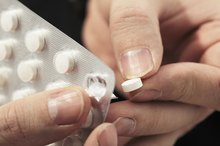Januvia is a brand name for an oral anti-hyperglycemic drug that lowers blood sugar or glucose levels. This prescription medication contains the active ingredient sitagliptin and belongs to a class of drugs called dipeptidyl peptidase-4 inhibitors. Januvia is taken once a day and works to regulate blood sugar levels in type 2 diabetics in two ways. Januvia.com notes that it helps increase the levels of insulin produced by the pancreas. Insulin is a hormone that is necessary to carry glucose from the blood into the cells of the body, where it can be used. Januvia also decreases blood glucose levels by decreasing the amount of glucose made by the liver. Like all medications, Januvia can cause side effects and may not be suitable for all patients. There are several alternative medications for treating type 2 diabetes.
Metformin
Metformin is commonly sold under the brand name Glucophage and is in the biguanide class of drugs 2. It is the most popularly prescribed medication and often the first line of treatment for patients with type 2 diabetes. Drugs.com notes that metformin works by reducing blood glucose levels as well as by heightening the sensitivity of body cells to the hormone insulin 2. Metformin is sometimes prescribed in combination with other diabetes medications or insulin 2. In individuals with pre-diabetes or a risk of becoming diabetic, metformin is often prescribed as a preventative measure, along with nutritional and exercise therapies 2.
Glyburide
Metformin vs. Januvia for Weight Loss
Learn More
Glyburide is a medication in a class of diabetes drugs called sulfonylureas 3. These drugs bind to receptors on the beta cells of the pancreas to stimulate more production of insulin. DiabetesNet.com notes that sulfonylurea medications have been used for the treatment of diabetes for many years and are often prescribed with metformin to control high blood sugar levels 23. Other sulfonylurea medications include Glucatrol and Glipizide.
Diabinese
Diabinese is a medication to treat type 2 diabetes that contains the active ingredient chlorpropamide 4. This drug is an oral hypoglycemic medication prescribed to lower blood glucose levels. Individuals with type 2 diabetes typically take this medication as a single dose in the morning with food, as advised by RxList.co 4m
Actos
Diabetic Medications That Cause Leg Swelling
Learn More
Actos is the brand name of a drug called pioglitazone in a family of diabetic medications called thiazolidinedione. This oral diabetic medication works to decrease blood glucose levels by increasing levels of insulin in the body. The National Diabetes Information Clearing House notes that it also increases insulin sensitivity in the liver, muscles and adipose tissue.
Related Articles
References
- Januvia.com: Consumer Information
- Drugs.com: Metformin
- DiabetesNet.com: Sulfonylureas
- RxList.com: Diabinese
- US FDA. FDA drug safety communication: FDA revises warnings regarding use of the diabetes medicine metformin in certain patients with reduced kidney function. 2017.
- American Diabetes Association. Pharmacologic Approaches to Glycemic Treatment: Standards of Medical Care in Diabetes—2019. Diabetes Care. 2019 Jan;42(Suppl 1):S90-S102.
- Doyle-Delgado K et al. Pharmacologic approaches to glycemic treatment of type 2 diabetes: Synopsis of the 2020 American Diabetes Association's standards of medical care in diabetes clinical guideline. Ann Intern Med 2020 Sep 1; [e-pub].
- Metformin. MedlinePlus, U.S. National Library of Medicine. 2018.
- US FDA. FDA drug safety communication: FDA revises warnings regarding use of the diabetes medicine metformin in certain patients with reduced kidney function. 2017.
Writer Bio
Noreen Kassem is a hospital doctor and a medical writer. Her articles have been featured in "Women's Health," "Nutrition News," "Check Up" and "Alive Magazine." Kassem also covers travel, books, fitness, nutrition, cooking and green living.









